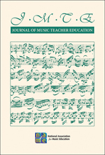
Journal of Music Teacher Education
metrics 2024
Transforming Music Education Through Research.
Introduction
The Journal of Music Teacher Education, published by SAGE Publications Inc, is a leading scholarly outlet dedicated to advancing the field of music education. With an ISSN of 1057-0837 and an E-ISSN of 1945-0079, this journal explores a wide array of topics pertinent to music teaching and learning, serving as a vital resource for both researchers and practitioners in the music education community. Since its inception in 1991, it has consistently been positioned among the top-tier journals in both music and education, achieving a notable Q1 ranking in music and Q2 in education as of 2023. With impressive Scopus rankings, placing it in the 89th percentile for music and 47th percentile for education, the journal plays a crucial role in facilitating dialogue and disseminating innovative research aimed at improving music pedagogy. While not an open-access publication, it provides access to invaluable insights and practices that inform both theory and application in music education, making it an essential read for educators, students, and researchers alike, as they navigate the evolving landscape of music teaching. Explore the latest findings and thought-provoking discussions that shape the future of music education in the United States and beyond.
Metrics 2024
 0.55
0.55 1.10
1.10 1.70
1.70 22
22Metrics History
Rank 2024
Scopus
IF (Web Of Science)
JCI (Web Of Science)
Quartile History
Similar Journals
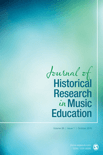
Journal of Historical Research in Music Education
Transforming Understanding through Historical Music Education ResearchThe Journal of Historical Research in Music Education, published by SAGE Publications Inc, stands as a vital resource dedicated to advancing the understanding of the intersection between music education and historical scholarship. With ISSN 1536-6006 and E-ISSN 2328-2525, this journal serves as a beacon for researchers, educators, and students interested in exploring the influences and developments in music education from a historical perspective. Although classified in the Q4 quartile across the fields of Education, History, and Music, and while it ranks lower in the Scopus rankings (e.g., #969 in History), the journal remains committed to shedding light on significant yet often overlooked historical contexts in music education. The journal's scope from 2015 to 2024 emphasizes contemporary interests and challenges faced in the field, encouraging the dissemination of innovative research. As an essential repository of knowledge, the journal invites submissions that critically engage with historical perspectives, ensuring that the narratives of music education continue to resonate within and beyond academic circles.

Musica Hodie
Exploring the Harmony of Knowledge in Music StudiesMusica Hodie is a pivotal academic journal published by the Universidade Federal de Goiás, Brazil, focusing on the field of music. The journal, with ISSN 1676-3939 and E-ISSN 2317-6776, serves as a vital platform for scholars, professionals, and students to disseminate innovative research findings and critical analyses related to music theory, history, and practice. With a prestigious Q2 ranking in the Music category and a Scopus rank of 103/180, the journal significantly contributes to the cultural and academic landscape of music studies in Brazil and beyond, covering converged years from 2010 to 2016 and also from 2018 to 2023. Although it operates under a subscription model, the journal remains committed to fostering open dialogue and knowledge sharing in the arts and humanities. As researchers delve into the intricacies of music, Musica Hodie stands out as a key resource for advancing scholarly discourse and enhancing the understanding of music’s multifaceted role in society.
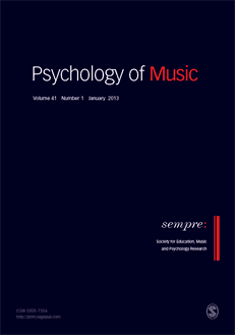
Psychology of Music
Transforming Perspectives on Music and EmotionPsychology of Music is a prominent academic journal published by SAGE Publications Inc, focusing on the interdisciplinary field that bridges psychological principles and musical expression. Established in 1973, this esteemed journal plays a crucial role in advancing understanding of how music affects emotions, cognition, and social interactions, thus catering to a diverse audience of researchers, educators, and practitioners in both psychology and music. With an impressive impact factor that places it in the Q1 category for Music and Q2 for Psychology (miscellaneous) in 2023, this journal ranks 3rd out of 180 in Arts and Humanities – Music, and 19th out of 97 in Psychology (miscellaneous) according to Scopus metrics, affirming its authoritative contribution to the field. The Psychology of Music is essential for those looking to explore cutting-edge research, methodologies, and applications, providing rich insights and fostering discussions that reach into music therapy, education, and psychological wellness. Although it is not an open-access journal, its high-quality peer-reviewed articles are pivotal for anyone dedicated to the intricate relationship between music and the mind, making it a must-read for professionals and students alike.
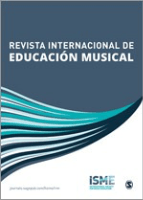
Revista Internacional de Educacion Musical
Fostering interdisciplinary dialogue in the vibrant world of music education.Revista Internacional de Educacion Musical, published by SAGE PUBLICATIONS LTD, is a prestigious journal dedicated to advancing the field of music education on a global scale. With an ISSN of 2307-4841, this journal serves as a vital platform for researchers, educators, and practitioners in music pedagogy, offering a wide array of peer-reviewed articles, theoretical discussions, and empirical studies. The journal aims to promote interdisciplinary dialogue and innovative practices within music education, emphasizing the importance of cultural diversity and contemporary educational methodologies. As part of SAGE Publications, known for its commitment to excellence in scholarly dissemination, the Revista Internacional de Educacion Musical plays a crucial role in shaping future trends and policies in music education. By fostering access to high-quality research, this journal is invaluable for those dedicated to enhancing the teaching and learning of music in educational contexts.
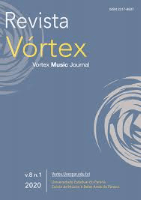
Revista Vortex-Vortex Music Journal
Advancing Knowledge Through the Art of MusicRevista Vortex-Vortex Music Journal is a premier open-access journal published by the Universidade Estadual do Paraná, specifically through its esteemed Escola de Música & Belas Artes do Paraná. With its ISSN 2317-9937, this journal serves as a critical platform for the dissemination of research and discourse in the field of musicology, music education, and the performing arts. Established in 2014, the journal has been dedicated to fostering scholarly exchange among researchers, practitioners, and students, emphasizing the significance of music as a cultural artifact and academic pursuit. As an open-access publication, it ensures that findings are readily available to a global audience, promoting inclusivity and engagement in the field. Located in Curitiba, Brazil, Revista Vortex invites contributions that explore a diverse range of topics and methodologies, seeking to enhance the understanding of music in contemporary society.

Revista Electronica de LEEME
Empowering Global Dialogue in Music and Education.Revista Electronica de LEEME, published by UNIV RIOJA, DEPT EXPRESION ARTISTICA, is a distinguished open-access journal that has been a vital resource in the fields of education and music since its inception in 1998. With a strong presence in Spain and an impressive Q1 ranking in Music and Q2 in Education as of 2023, the journal has established itself as a leading platform for high-quality research in the Arts and Humanities. The journal’s Scopus ranks demonstrate its scholarly impact, particularly its ranking of 21 out of 180 in Music, showcasing an 88th percentile standing, while it holds the 838 out of 1543 position in Education, reflecting its critical relevance in this domain. Covering a diverse array of topics related to artistic expression and pedagogical innovation, the Revista Electronica de LEEME aims to enrich the academic landscape by promoting open scholarship and accessible knowledge sharing. Researchers, professionals, and students are encouraged to engage with its comprehensive articles and findings, which are available free of charge, fostering a global dialogue among scholars dedicated to advancing education and musicology.

TEACHING AND TEACHER EDUCATION
Advancing Education Through Rigorous ScholarshipTEACHING AND TEACHER EDUCATION is an esteemed academic journal dedicated to advancing the fields of education and teacher training. Published by Pergamon-Elsevier Science Ltd, this journal has garnered substantial recognition, holding a prestigious Q1 category in Education as of 2023, and ranking #160 out of 1543 in Scopus's Social Sciences Education category, placing it in the top 89th percentile. Since its inception in 1985, the journal has been pivotal in disseminating cutting-edge research, theoretical developments, and practical applications for educators and policy-makers. The journal's scope encompasses a wide array of topics, including but not limited to pedagogical practices, teacher education curriculum, and innovative teaching methodologies. While it does not operate under an open access model, it remains influential by providing a critical platform for rigorous scholarship that impacts teaching practices globally. Located in the United Kingdom, TEACHING AND TEACHER EDUCATION is a vital resource for researchers, professionals, and students who are dedicated to shaping the future of education.

Opus
Exploring the Harmonies of Music ResearchOpus is an esteemed open-access journal published by the Associação Nacional de Pesquisa e Pós-Graduação em Música in Brazil, focusing on the field of music studies. With an ISSN of 1517-7017, Opus has been dedicated to fostering innovative research since its inception and has embraced the open-access model since 2009, ensuring that its findings are readily accessible to scholars and enthusiasts globally. The journal has achieved a commendable Q2 ranking in Music as of 2023, showcasing its impact and relevance within the arts and humanities. Although currently ranked #130 out of 180 in Scopus in the music category, Opus maintains a commitment to enhancing the scholarly discourse in musicology through empirical studies, theoretical analyses, and interdisciplinary approaches. The journal's convergence over the years, from 2017 to 2024, reflects its dedication to evolving educational and research methodologies in music. Situated in the vibrant academic landscape of Campinas, SP, Brazil, Opus invites researchers, professionals, and students to contribute to its mission of exploring the multifaceted dimensions of music.
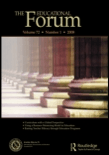
EDUCATIONAL FORUM
Advancing Knowledge and Dialogue in EducationEDUCATIONAL FORUM, published by Routledge Journals, Taylor & Francis Ltd, is a premier academic journal that serves as a vital platform for innovative research and discourse in the field of education. With an ISSN of 0013-1725 and an E-ISSN of 1938-8098, this journal has been at the forefront of educational scholarship since its inception in 1936, continuing to disseminate critical insights through 2024. Recognized in the Q2 category of education in 2023, it holds a Scopus rank of 768 out of 1543 in the social sciences, placing it in the 50th percentile overall. Though it does not offer open access, the journal provides an essential resource for researchers, professionals, and students aiming to expand their understanding of current educational practices, policies, and innovations. By fostering an academic environment rich in rigorous analysis and thoughtful discussion, EDUCATIONAL FORUM plays an indispensable role in shaping the future of education.

Problemy Muzykalnoi Nauki-Music Scholarship
Advancing Knowledge in Music Theory and CultureWelcome to Problemy Muzykalnoi Nauki-Music Scholarship, a leading journal in the field of music scholarship published by the esteemed Gnesin Russian Academy of Music. With an ISSN of 2782-358X and an E-ISSN of 2782-3598, this Open Access journal has been committed to the dissemination of high-quality research since 2009, making scholarly work accessible to a global audience. Covering diverse aspects of music theory, history, and its socio-cultural impacts, Problemy Muzykalnoi Nauki serves as an essential platform for scholars, educators, and practitioners in the arts and humanities, as well as in social sciences related to music education. While its Scopus coverage was discontinued in 2021, the journal remains influential, holding a rank of #48 in the Arts and Humanities category and a percentile of 67th, showcasing its relevance and rigor in the discipline. We invite researchers and students alike to explore the rich contributions made within these pages, fostering a deeper understanding and appreciation of music in contemporary society.